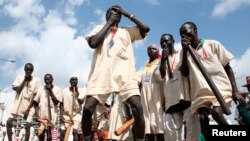More than 20,000 Sudanese and South Sudanese forced by violence to flee their refugee camps in northwestern Ethiopia are in desperate need of lifesaving aid.
A camp hosting 10,300 Sudanese and South Sudanese refugees in Ethiopia’s northwestern region of Benishangul-Gumuz was looted and burned on January 18.
This, after fighting broke out between unidentified armed groups and federal forces in the nearby town of Tongo.
This alarming event followed the looting of another camp in the area in late December.
A spokesman for the U.N. high commissioner for refugees, Boris Cheshirkov, said the situation in this region has been very tense since violence first erupted in December.
“A total of 22,000 people in both camps have been cut off from access and assistance since then," Cheshirkov said. "All humanitarian staff have had to evacuate, and access to the area including to the two camps remains impossible. “
The Benishangul-Gumuz region borders Sudan and South Sudan. It hosts more than 70,000 refugees from those countries, as well as more than a half-million Ethiopians internally displaced by intercommunal violence and conflict.
Cheshirkov reports that since violence erupted in December, more than 20,000 refugees have made the long, difficult trek to three different sites closer to Asosa, the regional capital. He said all have arrived exhausted and in need of assistance.
“UNHCR, the U.N. refugee agency, and partners are rushing life-saving aid to more than 20,000 refugees," Cheshirkov said. "UNHCR is working with the Ethiopian Refugee and Returnees Service and partners to provide the most urgent assistance to displaced refugees, including hot meals, clean water, and medical care.”
Cheshirkov said regional authorities are setting up a new temporary site that can hold 20,000 people. He said UNHCR is working to install basic services including shelter, water collection points and latrines. It then will seek to relocate the refugees to the new site as soon as possible.




